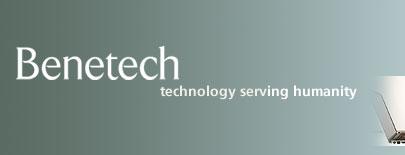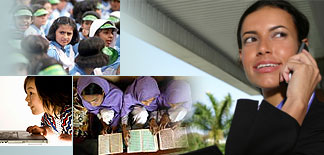
Jim Fruchterman |
January 2004
Writing these quarterly updates is fun for me. Looking at our progress every few months helps me realize how much our team is accomplishing. At the same time, there is so much more that needs doing! Here are the highlights of this letter:
- Benetech is growing from two major projects to four in 2004:
- Merger of the Human Rights Data Analysis Group into Benetech
- Bookaccess
- Bookshare.org
- Martus
- Spreading the word: Benetech’s recent awards, publications and speaking opportunities
- Growth of the Benetech Fellows Program from one to five
- Goals for 2004
- BACK TO TOP -
Expanding Benetech's Reach
In 2000, we set out to move from a single social enterprise project (the Arkenstone reading machines for people with disabilities), to the creation of an organization capable of launching multiple new enterprises. In 2002, we launched our first new endeavor: Bookshare.org, an Internet-based electronic book library for people with disabilities in the U.S. In 2003, we expanded into the human rights field with the Martus Project, to bring basic software tools to grassroots groups documenting and monitoring rights abuses worldwide. In 2004, we are adding at least two major projects: the Human Rights Data Analysis Group and Bookaccess. Both of these relate to our existing projects, but expand our reach into different communities with additional needs. Here’s a brief introduction to Benetech’s 2004 roster of exciting social enterprise projects:
The Human Rights Data Analysis Group (HRDAG)
A defining moment in the creation of our Martus Project was when I met Dr. Patrick Ball of the American Association for the Advancement of Science. Patrick is one of the world’s leading human rights statisticians and has broad experience and connections with both grassroots and international human rights groups. Patrick provided us with very real perspectives on answering our question: “How can Silicon Valley help prevent human rights abuses?”
In January, Patrick and HRDAG will relocate to Palo Alto as part of Benetech. HRDAG has a wealth of expertise in serving the sector with database solutions and technical assistance, including a network of field consultants that provide direct support to groups around the world. By combining HRDAG with Martus, we build critical mass with a group that wants to change the human rights field around the world by providing the technology tools to more effectively make the case for human rights.
Bookaccess
Access to books is critical for disadvantaged communities around the world. Education, economic opportunity and full participation in civil society all depend on literacy and access to the information in books. Our Bookshare.org project has focused on bringing digital talking books to people with disabilities. Our new Bookaccess initiative intends to use this same technology to benefit students without disabilities in the developing world. Just as the format of a printed book presents a barrier to access by a blind person, the expense of a printed book presents a barrier to students who are impoverished. We will be working with universities in the U.S. to experiment with different ways to deliver books to university students in developing countries around the world. Look forward to more announcements on this in the coming months!
Bookshare.org
Bookshare.org now has more than 15,000 books in its online library. Our large initiative for early 2004 is a new program responding to requests from schools: providing a new and low-cost way for schools to deliver accessible texts to students with disabilities. We have the benefit of some new funders backing this direction: the George B. Storer Foundation and Cable Co-op have each committed $75,000 to Bookshare.org. This is in addition to continuing support from NEC Foundation of America, the Community Technology Foundation of California, the Lavelle Fund for the Blind and the Bernard A. Newcomb Foundation at the Peninsula Community Foundation. Our list of product partners continues to grow, as many assistive technology software or hardware developers have built support for seamlessly opening and reading Bookshare.org books, including Kurzweil 1000 and 3000, OpenBook, BrailleNote, BookCourier and Elba. With additional funding from the Yale/Goldman Sachs Nonprofit Business Plan competition, we also were able to conduct a detailed survey of Bookshare.org users and found out how much they appreciated Bookshare.org, as well as gleaned many suggestions for improving the service.
Martus
Marc Levine, our peripatetic senior product manager for the Martus Project, has been around the world training human rights groups on our software. In its first eleven months of operations, Martus has been downloaded by users from more than 47 countries, and it has been deployed, adopted and used regularly by NGOs in over ten countries, including Afghanistan, Guatemala, Peru, the Philippines, Sierra Leone, Sri Lanka, Uzbekistan and the U.S. Martus is currently translated into Spanish and Russian, and in 2004 we expect to add Arabic, Bangla, French, Khmer, Nepali and Thai. We’ve released and upgraded the Martus client and Martus backup server several times this year, and the last major piece of the Martus Project, the Martus search engine, is now in beta test. The search engine provides a web-searchable archive of public information about human rights violations. Based on grants and expected contracts, Martus should be financially self-supporting in 2004.
- BACK TO TOP -
Spreading the Benetech Word
The Benetech message is that technology has incredible unused power to improve the world. Just because a socially beneficial technology application can’t build a $50 million a year business and generate financial returns over 30% a year, does not mean that it should die. Our message is gaining increasing attention, as illustrated by the ever-growing list of awards, publications and speaking opportunities that come to us:
- Fast Company named Benetech as one of its twenty “Social Capitalists,” and the only technology group in this inaugural list of top social entrepreneurs
- In late January 2004 I have been invited to speak at two sessions at the World Economic Forum in Davos, Switzerland, thanks to the support of the Schwab Foundation for Social Entrepreneurship
- Business for Social Responsibility annual conference in Los Angeles invited me to speak at a keynote session on Seizing Market Failure as an Investment Opportunity
- I was invited to keynote the World Blind Union Asia Pacific conference in Singapore. Entitled In the Palm of Your Hand, my speech was based on an article I recently published by the Journal of Vision Impairment and Blindness
- Tech Museum Awards: Technology Benefiting Humanity. The Martus Project was a laureate in the most recent awards, and Benetech is the only organization to have been named a Tech Museum Award Laureate twice
- The BeneBlog: we’ve launched a weblog for people who want to track the latest from Benetech. The latest posting is on our home page, plus an archive of past postings, as well as a way to subscribe to the BeneBlog by email
- Speaking engagements at the Haas Business School and Engineering School at UC Berkeley, Stanford Business School, Commonwealth Club and the Social Enterprise Institute
- BACK TO TOP -
Fellows program growth
My last update described our plans for launching a Benetech Fellows Program, to provide business and technology professionals with the opportunity to join Benetech and gain exposure to our model and our mission. Benetech benefits by getting talented people to pitch in with our projects. Here’s a list of the current Benetech Fellows:
- Chiawei Lin, Martus Engineering Fellow
- Ming Wong, Bookshare.org Engineering fellow
- Gerry Sinzdak, Business Development Fellow
- Anna Berns, Martus Product Management Fellow
- Heather Ford as a joint Benetech/Reuters Digital Vision Fellow
- BACK TO TOP -
Goals for 2004
Beyond the four major projects described above, our pipeline continues to fill with great ideas. My goals for 2004 combine successfully executing on our business plans for both our major projects and the upcoming projects we plan on tackling. To do so, we need to find more funding for our Benetech Initiative Fund: unrestricted funds for developing social enterprise business plans, prototyping technology and first round funding to the most worthy projects. We greatly benefited in 2003 from key unrestricted support, and hope to grow that in 2004. Some of the projects that we plan to undertake with this kind of assistance are:
- Route66/All-Link. We did great things with a $50,000 grant from the Severns Family Foundation, and are working with the New Sector Alliance strengthening our business plan for this literacy technology that teaches people with significant developmental disabilities how to read.
- Navitalker. This service provides GPS location capabilities for people with disabilities using a standard cellular phone.
- ReadingCam. A camera-equipped cellular phone that can read signs aloud to illiterate and disabled people.
- Landmine Detector Project. As time goes on, it is clearer and clearer that we can work with defense contractors to create a humanitarian version of the latest magnetic resonance explosive detectors. The technology is there. It just takes money.
- Moyer Electronic Valve System. Imagine improving gas mileage by
over 40% and reducing greenhouse gases by 30% from cars! We are assisting
this social enterprise effort with consulting on pricing and business
planning.
- BACK TO TOP -
Conclusion
We are looking forward to 2004 and expanding several-fold the number of people benefiting from our technology tools. The need for technology tools in the social sector has never been greater. Not only do we want to expand Benetech’s capabilities to meet these needs, but we also have to catalyze the creation of more Benetechs. The technology community has so much more to offer the world. Your help in realizing that vision is appreciated, as always. Thank you for your support and encouragement!
Jim Fruchterman
President and CEO, The Benetech Initiative
Email: [email protected]
![]()

